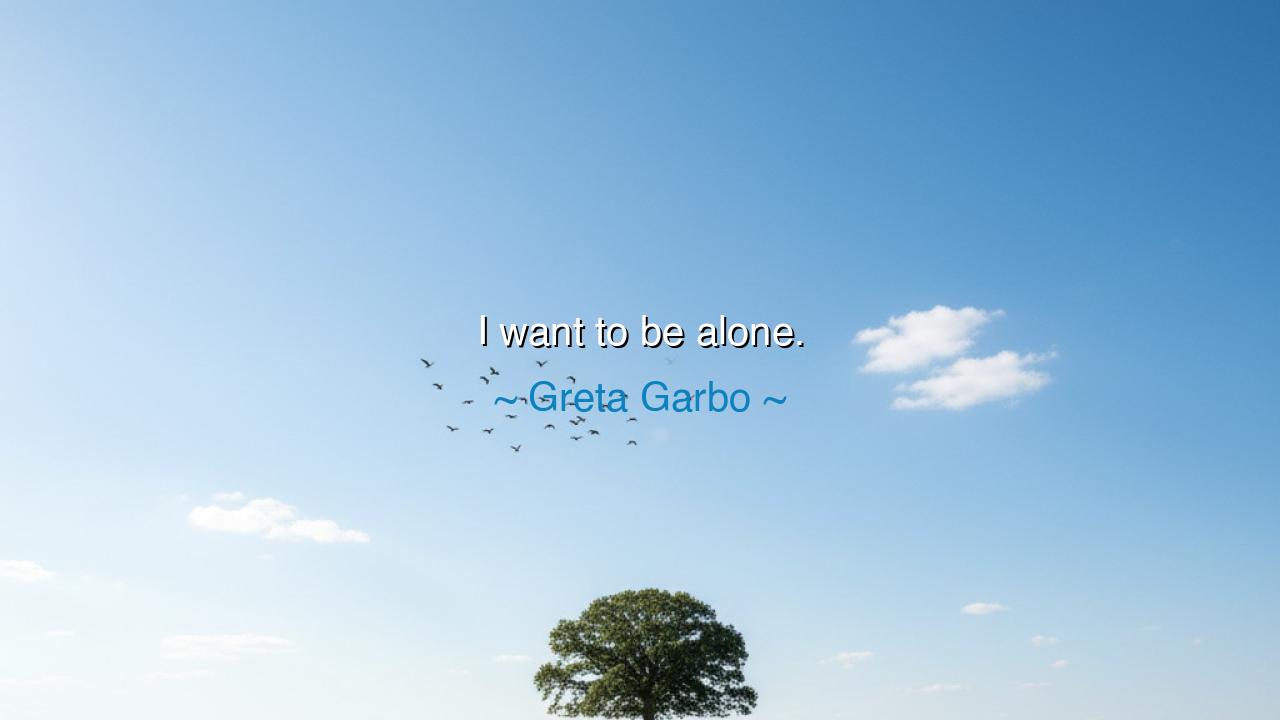
I want to be alone.






Greta Garbo famously declared, "I want to be alone." These words, simple in their brevity, speak volumes about the power and necessity of solitude. To the world, Garbo’s statement was not just a personal desire but an embodiment of a universal truth: there are times when one must retreat into the quiet of their own soul, away from the noise and demands of the world, to find peace and clarity. To want to be alone is not a rejection of the world, but a conscious choice to seek a deeper connection with oneself. It is in these moments of solitude that we can hear the true whispers of our hearts, away from the distractions of external expectations.
In the wisdom of the ancients, the philosophers understood the importance of solitude. Socrates, in his dialogues, emphasized that the life not examined is not worth living. To examine one’s life, to search deeply within, requires solitude—the space to step away from the world and look inward. The Stoics, particularly Epictetus, taught that true freedom comes not from the external world but from mastery over oneself. To be alone was not a weakness, but a strength; it was a means of confronting the self and finding true peace. Socrates and Epictetus, though surrounded by others, often sought moments of solitude to reflect and align their lives with their highest principles. In this, they found wisdom—not in the bustle of the marketplace, but in the quiet recesses of their minds.
The great artist Michelangelo, too, lived much of his life in solitude. Though his masterpieces, from the David to the Sistine Chapel, were created under the gaze of patrons and the public, much of his inner life was spent in seclusion. Michelangelo once wrote, "The true work of art is but a shadow of the divine perfection." His solitude allowed him the space to tap into his deepest creativity and produce works of such beauty and meaning that they would endure for centuries. For Michelangelo, as for Garbo, being alone was not a rejection of the world but a way of connecting more deeply with the divine and the sublime. In solitude, he could create art that would speak to the world long after he had gone.
In modern times, Virginia Woolf, the renowned English writer, also sought solace in her own company. Her solitude allowed her to explore the inner workings of the human mind, leading to some of the most groundbreaking literature of the 20th century. Woolf’s novels, including Mrs. Dalloway and To the Lighthouse, delve deep into the complexities of the inner world, exploring the themes of time, memory, and the self. Her solitude, while often fraught with its own struggles, gave her the space to create and to connect with the depths of her own psyche. Like Garbo, Woolf recognized that true creativity and self-discovery often emerge from the moments of isolation when one is free to contemplate and reflect without external interference.
Yet, society often misunderstands those who desire solitude. Loneliness, as it is often called, is seen as a curse, something to be avoided at all costs. People fear being alone, thinking it a sign of rejection or unworthiness. The fear of solitude is often tied to the belief that one must be constantly surrounded by others to be whole. Yet, as Garbo’s quote suggests, there is power and freedom in the desire to be alone. In these moments, we discover our own strength, and we are freed from the expectations that come with society’s constant gaze. When we learn to embrace solitude, we can connect more deeply with our true self and the world in a way that is not reliant on external validation.
The lesson from Garbo’s words, and the examples of those who have embraced solitude, is profound: solitude is not a void to be feared, but a space to be cherished. It is in solitude that we find our clarity, our strength, and our creativity. Loneliness, when chosen, becomes an opportunity for self-reflection, growth, and transformation. Instead of fearing time alone, we should seek it, for it is in those quiet moments that we come to understand who we truly are, free from the noise and distractions of the world.
Therefore, dear reader, I urge you to reflect on your own life. When was the last time you truly spent time in solitude—not as a result of external circumstances, but as a choice? Seek those moments of quiet reflection, where you can listen to the whispers of your heart and reconnect with your inner self. Solitude does not isolate us; it empowers us, giving us the freedom to create, to reflect, and to grow. Like Greta Garbo, embrace those moments when you choose to be alone, knowing that in them lies the potential for your greatest discoveries and your truest self-expression.






AAdministratorAdministrator
Welcome, honored guests. Please leave a comment, we will respond soon